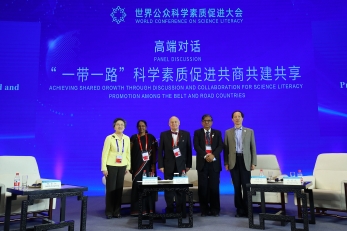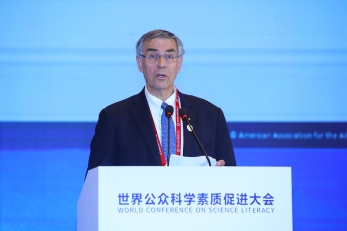The World Conference on Science Literacy was held in Beijing from the 17th to 19th of September 2018. Focusing on "Science Literacy for a Shared and Better Future" and the UN Sustainable Development Goals (SDGs), all of the participants fully exchanged their views and have reached the following consensus:
1. Promoting positive interactions between society and science and technology in their broadest sense. Science and technology are bringing fundamental changes into all aspects of human production and life at an unprecedented rate, breadth and depth. Science and technology contribute to the progress of human society and enrich people’s spiritual world, yet they also carry risks and uncertainties that we cannot afford to ignore. Research integrity should be promoted to ensure that the general public understand and are involved in science, that the value of science and technology are fully realized, and that science and technology serve the overall and long-term interests of mankind.
2. Understanding our mission and responsibilities. Science literacy is an intrinsic requirement for an individual's all-round development, for the social foundation of a nation's innovation capacity and sustainable development, as well as for the intellectual foundation of mutual understanding and peace in human society. Science literacy not only involves mastery of scientific knowledge and scientific methods, but also demands respect for the pursuit of the scientific spirit and evidence-based scientific thinking. The improvement of science literacy is concerned with the future of both individuals and nations as well as the wisdom and capabilities of human beings in coping with a variety of risks and challenges for building a better world.
3. Working together to narrow the gap in science literacy. There are large gaps in the levels of public science literacy between different countries. International mechanisms for science literacy exchange and cooperation need to improve, so that everyone around the world aspires to raise their scientific and cultural literacy and to achieve common prosperity and development. All nations should vigorously drive forward science education, communication and popularization, should eliminate barriers to scientific knowledge sharing, should narrow the gap in knowledge and development between countries, and should promote sustainable development for everyone.
4. Persistently promoting universal benefit and fairness. All nations should prioritise improving science literacy among different geographic areas and different population groups, so that all of the general public can enjoy the benefits of modern civilization. We should make every effort to protect and stimulate the enthusiasm of younger generations in science, to help the poorest in society to narrow the gap in science literacy so as to bring them hope and opportunities to end poverty, and to enable women to fully enjoy the dignity brought about by the improvement of science literacy.
5. Building a mechanism for collaboration and exchanges. Science and technology organizations shoulder fundamental responsibilities for the promotion of public science literacy. All stakeholders including governments, educational organizations, industry and the media should devote themselves to the promotion of science literacy with greater commitment and take positive actions to develop closely coordinated social networks. All participants agree to encourage international exchanges and cooperation and to promote the sharing of experience and resources. We call on all agencies to work together to strengthen effective mechanisms for achieving shared growth through discussion and collaboration. We will strive to include the promotion of public science literacy into the Sustainable Development Agenda of the United Nations.
Let us work together to promote the harmonious development of science and technology with culture, society and nature, to contribute to the improvement in public science literacy, and to create a better future for the whole of human society.


